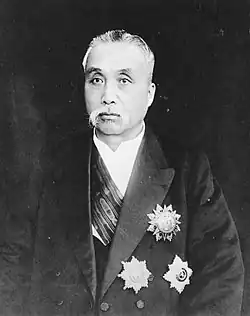Xu Shichang
Xu Shichang | |||||||||||||||||||||||||||||||||||||||||||||||||
|---|---|---|---|---|---|---|---|---|---|---|---|---|---|---|---|---|---|---|---|---|---|---|---|---|---|---|---|---|---|---|---|---|---|---|---|---|---|---|---|---|---|---|---|---|---|---|---|---|---|
徐世昌 | |||||||||||||||||||||||||||||||||||||||||||||||||
 | |||||||||||||||||||||||||||||||||||||||||||||||||
| President of the Republic of China | |||||||||||||||||||||||||||||||||||||||||||||||||
| In office 10 October 1918 – 2 June 1922 | |||||||||||||||||||||||||||||||||||||||||||||||||
| Premier | Qian Nengxun Gong Xinzhan (acting) Jin Yunpeng Yan Huiqing (acting) Sa Zhenbing (acting) Liang Shiyi Zhou Ziqi (acting) | ||||||||||||||||||||||||||||||||||||||||||||||||
| Preceded by | Feng Guozhang | ||||||||||||||||||||||||||||||||||||||||||||||||
| Succeeded by | Zhou Ziqi | ||||||||||||||||||||||||||||||||||||||||||||||||
| Premier of the Republic of China | |||||||||||||||||||||||||||||||||||||||||||||||||
| In office 22 March – 23 April 1916 | |||||||||||||||||||||||||||||||||||||||||||||||||
| President | Yuan Shikai | ||||||||||||||||||||||||||||||||||||||||||||||||
| Preceded by | Lu Zhengxiang (as Prime Minister of the Empire of China) | ||||||||||||||||||||||||||||||||||||||||||||||||
| Succeeded by | Duan Qirui | ||||||||||||||||||||||||||||||||||||||||||||||||
| In office 1 May 1914 – 22 December 1915 | |||||||||||||||||||||||||||||||||||||||||||||||||
| President | Yuan Shikai | ||||||||||||||||||||||||||||||||||||||||||||||||
| Preceded by | Sun Baoqi (acting) | ||||||||||||||||||||||||||||||||||||||||||||||||
| Succeeded by | Lu Zhengxiang (as Prime Minister of the Empire of China) | ||||||||||||||||||||||||||||||||||||||||||||||||
| |||||||||||||||||||||||||||||||||||||||||||||||||
| Personal details | |||||||||||||||||||||||||||||||||||||||||||||||||
| Born | 20 October 1855 Weihui, Henan, Qing China | ||||||||||||||||||||||||||||||||||||||||||||||||
| Died | 5 June 1939 (aged 83) British concession of Tianjin, Tianjin, Republic of China | ||||||||||||||||||||||||||||||||||||||||||||||||
| Political party | Anfu Club | ||||||||||||||||||||||||||||||||||||||||||||||||
| Other political affiliations | Anhui clique | ||||||||||||||||||||||||||||||||||||||||||||||||
| Education | jinshi degree in Imperial examination (1886) | ||||||||||||||||||||||||||||||||||||||||||||||||
| Signature | |||||||||||||||||||||||||||||||||||||||||||||||||
Xu Shichang (Chinese: 徐世昌; pinyin: Xú Shìchāng; Wade–Giles: Hsü2Shih4-ch'ang1; courtesy name Juren (Chinese: 菊人; pinyin: Júrén; Wade–Giles: Chu-jen); 20 October 1855 – 5 June 1939) was a Chinese politician who served as the President of the Republic of China from 10 October 1918 to 2 June 1922. A member of the Anhui clique, he was the only permanent president of the Beiyang government to be a civilian; his presidency was also the longest of the Warlord Era. Previously, he was Minister of the Cabinet of the Imperial Cabinet during the Qing dynasty.
Biography
Xu Shichang's ancestral hometown was Yinxian County (current Yinzhou District), Ningbo, Zhejiang. Born in Weihui, Henan, he was Yuan Shikai's closest friend. He was at one time the Viceroy of the Three Northeast Provinces, served as minister of the cabinet in Prince Qing's Cabinet, and tutored the final Qing Emperor, Puyi.[1] At the end of the Qing dynasty, Xu was made chief of the general staff despite being a civilian. Following the overthrow of the monarchy and the establishment of the Republic of China, he was appointed minister of state by Yuan Shikai in 1912, as the latter hoped that this would appease the pro-Qing Royalist Party.[1] Xu resigned as secretary of state (premier) in protest of Yuan's self-proclaimed monarchy in late 1915. He resumed his post after Yuan abandoned monarchism on 22 March 1916.[2]
His election as president was largely engineered by Duan Qirui and his Anhui clique. He was chosen because he was a civilian yet had close ties to the Beiyang Army and was neutral to both its Zhili and Anhui cliques. Lacking any military power of his own, he had to play Duan, Zhili leader Cao Kun, and Fengtian leader Zhang Zuolin against each other to stay in power.
Xu believed the monarchy would eventually be restored, and to prepare Puyi for the challenges of the modern world had hired Reginald Johnston to teach Puyi "subjects such as political science, constitutional history and English".[3]
He held a massive celebration in Beijing for China's victory in World War I on 18 November 1918. However, he then brought troops into the Allied intervention in the Russian Civil War. A ceasefire with Sun Yat-sen's rival Constitutional Protection Junta based in Guangzhou was declared and intellectuals were given greater freedom. This lasted until news from France revealed that Duan Qirui had promised former German territory in Shandong to Japan. Large student protests in the May Fourth Movement led to Xu cracking down with mass arrests. Ma Jun (馬駿), a Muslim, led protests against the Versailles Treaty.[4][5][6][7][8][9][10][11][12] The delegation was ordered home and China refused to sign or ratify the Treaty of Versailles. Consequently, the shaky alliance between the Zhili and Anhui cliques collapsed with Duan decisively defeated. This led to the era of high warlordism. Conflict with the anti-Beiyang movements in Southern China flared again in 1920, and he also failed to retake Outer Mongolia. Cao Kun, who never liked Xu, pressured him out of office and restored Li Yuanhong.
Xu retired from politics and moved to the British concession in Tianjin, where he died on 5 June 1939 at the age of 83.[13][14]
References
- ^ a b Chi (1970), p. 63.
- ^ "REPUBLIC DISPLACES MONARCHY IN CHINA; Yuan Shih-kai Decides to Reject Imperial Post and Resumes the Presidency". The New York Times. 1916-03-23. ISSN 0362-4331. Retrieved 2018-03-09.
- ^ Li, Kay. ""Saint Joan" From A Chinese Perspective: Shaw and the Last Emperor, Henry Pu-Yi Aisin-Gioro". Shaw. 29 (2009): 113.
- ^ Aliya Ma Lynn (1 August 2007). Muslims in China. University Press. ISBN 978-0-88093-861-7.
- ^ "Info". hzwxzzs.com. Archived from the original on 2018-08-26. Retrieved 2019-10-31.
- ^ 北京李大钊故居研究室 (9 June 2015). 李大钊北京十年(交往篇). 中央编译局. pp. 149–. GGKEY:5GWR5PC215D.
- ^ "英勇的回族英雄——马骏--黑龙江频道--人民网". hlj.people.com.cn. Archived from the original on 2016-04-07. Retrieved 2016-03-26.
- ^ "馬駿 - 英烈紀念堂 - 中國軍網". www.81.cn.
- ^ "马骏 - 英烈纪念堂 - 中国军网". www.81.cn.
- ^ [1]
- ^ [2]
- ^ "回族烈士马骏_中国论文网". Archived from the original on 2016-04-06. Retrieved 2021-09-21.
- ^ "HSU SHIH-CHANG; President of Chinese Republic From 1918 to 1922 Was 81". 1939-06-07. Retrieved 2025-08-09.
- ^ "民國近代史". digroc.pccu.edu.tw. Retrieved 2025-08-09.
Sources
- Chi, Madeleine (1970). China Diplomacy, 1914-1918. Cambridge, Massachusetts: Harvard University Press. ISBN 9780674118256.
External links
 Media related to Xu Shichang at Wikimedia Commons
Media related to Xu Shichang at Wikimedia Commons- China After the War (1920, English translation)
.svg.png)
